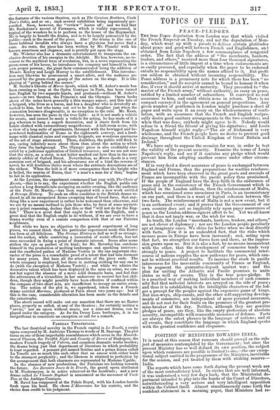TOPICS OF THE DAY.
PEACE-PLEDGES.
THE true Peace deputation from London was that which visited the French Emperor on Tuesday, and not the deputation of Mon- day, which went up with a parade to deliver certain platitudes about peace and good-will between French and Englishmen, and obtained from Louis Napoleon a few commonplaces of congenial order. The fact that the address of "the merchants, bankers, traders, and others," received more than four thousand signatures, is a circumstance of little import at a time when endorsements are so easily procured, and especially when the paper to be endorsed entails no responsibility upon the names affixed to it. But profit can seldom be obtained without incurring responsibility. The Peace address is a promissory note for which there has been "no consideration," and its acceptor cannot be bound to honour it when due, if ever it should arrive at maturity. They presented to "the master of the French army," without authority, an essay on peace, ratified by a limited number of subscribers. It conveyed no real assurance to him, and could obtain none in return. Ther4 is no compact conveyed in the agreement on general propositions. Any given number of gentlemen in London might purchase a sheet of paper and write upon it an essay on the wholesomeness of venti- lation, with an assurance that the French and English recipro- cally desire good sanitary arrangements in the two countries; and when that was done, anybody might agree to it. Nobody would refuse to a friend the favour of giving his signature ; and Louis Napoleon himself might reply—" The air of Richmond is very wholesome, and the French people have no desire to prevent good drainage throughout the United Kingdom of Great Britain and Ireland."
We have only to suppose the occasion for war, in order to test the validity of the present security. Examine the terms of Louis Napoleon's reply, and see if it contains any pledge which would prevent him from adopting another course under other circum- stances.
If in very deed a direct assurance of peace is exchanged between England and France, then the preparations for warlike reinforce- ment which have been observed in the great ports and arsenals of France are incompatible with the pacific policy thus proclaimed. If the people of England have the deep faith in the endurance of peace and in the consistency of the French Government which is implied in the London address, then the reinforcement of Malta, which has occasioned some uneasiness in Paris, is an inconsistency on our part, and there is a want of logical cohesion between the two facts. The reinforcement of Malta is not a new event, but it is an authorized event; and it proves that the Government of our own country does not so implicitly rely upon paper assurances of peace as the London address-signers affect to be. Yet we all know that it does not imply war, or the wish for war.
In truth, the London "merchants, bankers, traders, and others," are not clever at diplomacy ; nor are the London people peculiarly apt at imaginary cases. We shine far better when we deal directly with facts. Now it is an undoubted fact, that the risks which menace peace in Europe have been increased ; and, acting. upon that fact, we strengthen our forces here and there, as the impres- sion grows upon us. But it is also a fact, by no means inconsistent with the other, that the development of commerce tends. very strongly to peace. A project to facilitate the commercial inter- course of nations supplies the new pathways for peace, which can- not be without practical results. To increase the stock in pacific intercourse for the mercantile community of France or England, is to augment the guarantee-deposit against war ; and the plan for uniting the Atlantic and Pacific promises to unite states as well as oceans. This is the true peace-pledge. It is a practical way of making individual members of each commu- nity feel that material interests are arrayed on the side of peace ; and thus it is establishing in the intelligible characters of the led- ger a precept for the peoples against the expensive game of kings. But iron-ways, ship-canals, and the other self-supporting develop- ments of commerce, are independent of mere personal assurance, and do not rest for their fruits on the promises of the greatest pro- mise-breaker of the day. Neither, although they are genuine pledges of peace, are they, like the empty professions of absolute security, incompatible with reasonable measures of defence. Facts are always the safest phrases in the language of nations ; and at all events, they constitute the language in which England speaks with the greatest confidence and eloquence.


























 Previous page
Previous page